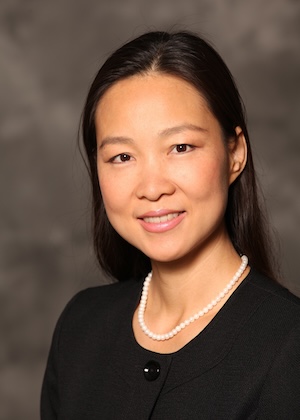Since immunotherapy has been approved by the Food and Drug Administration to treat advanced head and neck cancer (HNC), it has offered patients new hope — and new challenges.
Many patients with HNC suffer psychosocial burdens before immunotherapy, likely due to disease- and treatment-induced side effects that can impact daily functions such as eating and speaking. Immunotherapy may worsen these burdens, given the advanced stage of cancer and the uncertainty of the treatment’s duration and side effects. Unfortunately, there is scarce evidence on immunotherapy-related psychosocial burdens, particularly for HNC.

Associate professor Canhua Xiao received the multisite R01 grant.
The five-year, multisite R01 grant was awarded to associate professor Canhua Xiao, PhD, RN, FAAN. On the biological side, Xiao and her team will examine the role of inflammation and the gut microbiome in developing psychosocial burdens. On the social side, research will investigate how environmental- and community-level social determinants affect HNC patients.
“This dual focus on biological and social factors will enable us to create multilevel interventions that combine individual and community approaches to improve the quality of life and long-term survival rates for patients with advanced HNC undergoing immunotherapy,” says Xiao.
“Our groundbreaking research is imperative as the incidents of HNC are increasing in the U.S. due to the prevalence of the human papillomavirus,” she adds.
In addition to Xiao, other Emory University faculty members working on the R01 grant include Theresa W. Gillespie, Terry Hartman, Yijuan Hu, Michael R. Kramer, Andrew H. Miller, Sudeshna Paul, Timothy D. Read, Nabil Saba and Edmund K. Waller as well as MD Anderson Cancer Center faculty members Veronika Fedirko and Neil D. Gross.
This research is supported by the National Cancer Institute of the National Institutes of Health under award number R01CA281873. The content is solely the responsibility of the authors and does not necessarily represent the official views of the National Institutes of Health.
About the Nell Hodgson Woodruff School of Nursing
As one of the nation’s top nursing schools, the Nell Hodgson Woodruff School of Nursing at Emory University is committed to educating visionary nurse leaders and scholars. Home to the No. 1 master’s, No. 3 BSN and No. 6 DNP programs nationwide, the school offers undergraduate, master’s, doctoral and non-degree programs, bringing together cutting-edge resources, distinguished faculty, top clinical experiences and access to leading health care partners to shape the future of nursing and impact the world’s health and well-being. Learn more at nursing.emory.edu.

